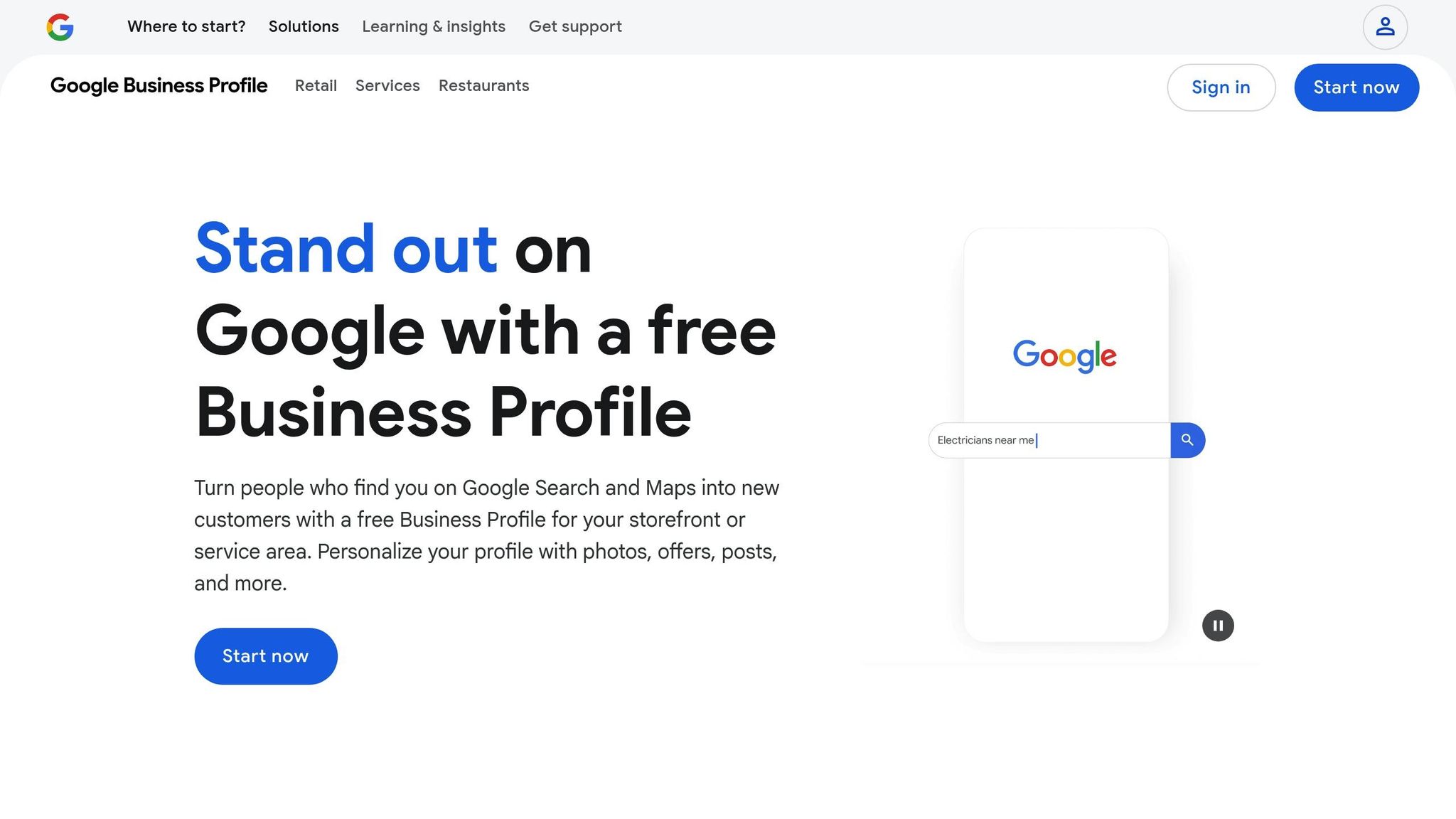Want more customers in Austin? Focus on the right keywords. Whether you’re in tech, real estate, or hospitality, using location-specific and service-based keywords can boost your online visibility. Local SEO connects you with nearby customers, especially as trends like voice search and mobile-first indexing grow. Here’s what you need to know:
- Tech companies: Target phrases like "Austin software companies" or "AI startups Austin."
- Real estate: Use terms such as "homes for sale Austin TX" or "Zilker homes for sale."
- Restaurants and hospitality: Focus on "best BBQ in Austin" or "hotels near SXSW Austin."
- Voice and mobile searches: Include conversational phrases like "Where’s the best taco near me?" or "24-hour locksmith Austin."
Quick Tip: Hyperlocal keywords like "coffee shops near UT Austin" or "Austin wedding venues" attract ready-to-act customers. Pair this with seasonal terms like "SXSW hotel deals" for maximum impact.
Track performance: Use tools like Google Analytics or Search Console to refine your strategy. Stay updated with Austin’s growing market and adjust keywords for trends like new neighborhoods, events, or voice search behaviors.
The NEW Way To Rank #1 on Google Maps in 2025 (FAST)
Main Keyword Types for Austin Businesses
Different keyword types play a crucial role in reaching customers at various stages of their search journey. Together, they create a well-rounded local SEO strategy, helping businesses tap into Austin’s vibrant and diverse market. Here’s how each type contributes to improving local visibility.
Business Service Keywords
Business service keywords are the backbone of any local SEO plan. These keywords describe your offerings while incorporating Austin-specific terms. For instance, primary service keywords like "Austin marketing agency", "plumbing services Austin", or "Austin wedding photographer" target users who know exactly what they need and where to find it.
Adding industry-specific modifiers refines your targeting even further. For example, tech businesses can use phrases like "Austin software development", "mobile app developers Austin TX", or "cybersecurity consulting Austin" to highlight their expertise while leveraging the city’s reputation as a tech hub.
Balancing search volume and competition is essential here. While broad terms like "Austin restaurants" attract high search traffic, they also face stiff competition. Niche combinations, such as "Austin farm-to-table catering" or "gluten-free bakery Austin", often provide better ranking opportunities for newer or smaller businesses.
Don’t overlook seasonal variations in Austin’s business environment. Keywords like "SXSW event planning Austin" see a surge in March, while terms like "Austin pool cleaning services" peak during the summer. Adjusting your keyword strategy to match these trends can help you capture seasonal demand.
Location and Neighborhood Keywords
Austin’s neighborhoods each have their own unique identity, and neighborhood-specific keywords cater to these distinctions. Phrases like "South Congress vintage shops", "Domain shopping Austin", or "East Austin food trucks" attract both locals and tourists exploring specific areas.
Landmark-based keywords are another effective strategy. By referencing well-known locations, businesses can draw attention from people near these high-traffic spots, whether they’re locals or visitors.
For hyperlocal targeting, ZIP code keywords (like "house cleaning 78704") are highly effective. They work particularly well for businesses serving specific areas or those looking to establish a strong local presence before expanding their reach.
Cross-neighborhood targeting helps businesses attract customers from multiple parts of the city. For example, a Central Austin restaurant could target phrases like "best brunch South Austin", "weekend dining East Austin", and "family restaurants North Austin", appealing to a broader audience across the city.
Service-Specific and Customer Intent Keywords
These keywords focus on customer needs and intent, complementing service and location strategies. Problem-solving keywords like "emergency AC repair Austin", "same-day delivery Austin", or "24-hour locksmith Austin" are designed to capture users with urgent needs, often leading to quick conversions.
Comparison keywords target users in the research phase. Phrases like "best Austin wedding venues", "top-rated Austin dentists", or "affordable Austin web design" indicate customers actively evaluating their options and nearing a decision.
For users ready to take action, transactional intent keywords are key. Phrases such as "buy Austin concert tickets", "book Austin hotel tonight", or "schedule Austin home inspection" signal immediate purchase intent, making them highly valuable for conversions.
Lastly, question-based keywords align with voice search trends and offer opportunities to appear in featured snippets. Examples include "how much does Austin house cleaning cost", "what permits needed Austin home renovation", or "where to find Austin gluten-free pizza." These keywords often face less competition and can help establish your business as an authority in its field.
Austin businesses that excel in local SEO combine these keyword types into a unified strategy. They use business service keywords to showcase their offerings, location keywords to dominate their geographic area, and intent-based keywords to capture customers at different points in their decision-making process.
Top Keywords by Industry in Austin
Austin’s economy is as diverse as its culture, offering businesses a variety of keyword opportunities tailored to their industry. Each sector has distinct search behaviors that businesses can tap into for better online visibility. By understanding these industry-specific keywords, companies can position themselves more effectively in their respective markets.
Tech Startups
Austin’s thriving tech scene fuels searches for terms like "Austin software companies," "tech startups Austin TX," and "Austin app developers." These keywords are essential for businesses looking to establish themselves in the local tech ecosystem.
For more niche searches, specialized terms like "AI startups Austin" and "fintech companies Austin" are highly effective. Austin’s growing prominence in artificial intelligence and financial technology makes these terms especially relevant for targeted audiences.
Recruitment-focused keywords are also vital in Austin’s competitive tech job market. Phrases such as "Austin tech jobs," "software engineer positions Austin," and "startup careers Austin" not only attract job seekers but also help companies showcase their workplace culture. Many local tech firms use these keywords on career pages and blogs to build their employer brand.
Investment-related keywords play a key role in Austin’s entrepreneurial landscape. Terms like "Austin venture capital," "startup funding Austin," and "tech incubators Austin" appeal to both entrepreneurs and investors. With major accelerators and venture capital firms based in the city, these keywords are particularly useful for connecting with the right audience.
Lastly, event-focused keywords highlight the city’s vibrant tech community. Searches for "Austin tech meetups," "SXSW tech events," and "startup networking Austin" connect businesses with local opportunities to grow and collaborate.
Switching gears from tech to real estate, the keyword strategies shift to reflect Austin’s booming property market.
Real Estate
Austin’s real estate market is fiercely competitive, making the right keywords critical for standing out. High-volume terms like "homes for sale Austin TX," "Austin real estate," and "houses Austin" are popular but come with stiff competition from major platforms and established agencies.
To narrow the focus, geographic-specific keywords are a smart strategy. Terms such as "Zilker homes for sale," "Domain condos Austin," "East Austin properties," and "South Congress real estate" help agents dominate specific neighborhoods. These localized searches often convert better as they align with precise buyer preferences.
Targeting specific property types can also yield results. Keywords like "Austin luxury homes," "condos downtown Austin," "investment properties Austin," and "first-time buyer homes Austin" cater to different buyer segments, from high-end shoppers to budget-conscious individuals.
Service-oriented keywords highlight the expertise of real estate professionals. Phrases like "realtors in Austin TX," "Austin home appraisal," "property management Austin," and "real estate photography Austin" are perfect for capturing users in need of specialized services beyond just listings.
Finally, market condition keywords attract informed buyers and sellers. Searches for "Austin housing market 2025," "home prices Austin TX," and "Austin real estate trends" are ideal for blog posts or analysis pages, helping to educate users while driving traffic.
From real estate, we move to Austin’s buzzing hospitality and food service industry, which thrives on its unique offerings.
Hospitality and Food Services
Austin’s food and hospitality scene draws massive attention from both locals and visitors. Food-related keywords like "best BBQ in Austin," "Austin food trucks," "breakfast tacos Austin," and "live music restaurants Austin" tap into the city’s culinary charm.
Restaurants looking to stand out can benefit from dining experience-focused keywords. Phrases such as "farm-to-table restaurants Austin," "rooftop dining Austin," "date night restaurants Austin," and "family-friendly restaurants Austin" cater to specific occasions and preferences.
Tourism-related keywords are also crucial for the hospitality industry. Terms like "boutique hotels downtown Austin," "hotels near SXSW Austin," "Austin weekend getaway," and "things to do Austin" target out-of-town visitors planning their trips.
Austin’s vibrant nightlife is reflected in beverage and nightlife keywords. Phrases such as "craft breweries Austin," "cocktail bars downtown Austin," "wine bars South Austin," and "happy hour specials Austin" resonate with both locals and tourists looking to enjoy the city after dark.
Location-specific keywords help businesses dominate their immediate area. Searches like "coffee shops near UT Austin," "restaurants Rainey Street," "bars Sixth Street Austin," and "hotels Austin airport" cater to users with precise location needs.
Lastly, event and catering keywords address Austin’s busy calendar of special occasions. Keywords like "wedding venues Austin TX," "corporate catering Austin," "private dining Austin," and "event spaces downtown Austin" help businesses connect with customers planning events.
The key to thriving in any Austin industry lies in pairing these targeted keywords with localized strategies. For example, a tech company might combine "AI startups Austin" with neighborhood-specific terms like "Domain tech companies," while a restaurant could use "best BBQ Austin" alongside "South Austin BBQ" to capture both broad and local interest.
Local Keyword Research Methods
Finding the right keywords for your Austin business takes a mix of specialized tools and practical techniques. The best keyword strategies dig deeper than generic terms, focusing on the exact phrases your local customers use when searching.
Using Keyword Research Tools
Keyword research tools are essential for uncovering search volume, competition levels, and new keyword opportunities in Austin. Google Keyword Planner is a great starting point, offering insights into Google’s search data, including monthly search volumes and competition metrics.
For a more detailed look at local search behavior, platforms like SEMrush and Ahrefs are invaluable. These tools allow you to filter results by location, revealing how Austin residents search. For example, you might notice people favoring phrases like "Austin web designer" over "web designer Austin TX".
Another useful tool is Google Trends, which highlights seasonal search spikes. For instance, searches for "Austin food trucks" tend to increase during events like SXSW or ACL. This data can help you plan content and advertising efforts around peak interest periods.
Including local landmarks and neighborhoods in your research adds even more relevance. Instead of sticking to broad terms like "restaurants", consider more specific phrases like "Zilker Park restaurants," "South Congress dining," or "Westlake Hills cafes".
Don’t overlook mobile keyword research. With most local searches happening on smartphones, tools that track mobile behavior can uncover shorter, conversational queries that users type while on the go.
Google Autocomplete and Related Searches
Google’s built-in search features provide a treasure trove of real user data. Autocomplete, for example, suggests phrases based on actual search behavior, making it a powerful tool for finding natural keyword variations.
Let’s say you run a plumbing business. Typing "plumber Austin" into Google might generate suggestions like "plumber Austin TX emergency," "plumber Austin cheap," or "plumber Austin reviews." These suggestions reveal specific modifiers and intent signals that potential customers frequently use.
The "People also ask" section in search results is another goldmine. These questions reflect what users are curious about and often highlight long-tail keyword opportunities. For example, searching "Austin real estate" might surface questions like, "What neighborhoods in Austin are up and coming?" or "How much does a house cost in Austin 2025?" Each of these could inspire content ideas and keyword targets.
At the bottom of Google’s search results, the Related Searches section offers even more variations. These suggestions can help you identify seasonal trends, local slang, or industry-specific terms that resonate with Austin users.
Voice search is another area to consider. Many Austin locals use voice commands for convenience, leading to conversational searches like "best BBQ near me" or "Austin coffee shops open now." Incorporating these natural language patterns into your strategy ensures you capture voice search traffic effectively.
Competitor Analysis for Keywords
Analyzing your competitors’ keyword strategies is one of the most effective ways to uncover opportunities in the Austin market. Start by identifying your main local competitors – both direct rivals and those ranking for the keywords you want to target.
Tools like SEMrush can provide a detailed breakdown of a competitor’s top-performing keywords, estimated traffic, and ranking positions. This analysis often reveals Austin-specific phrases or neighborhood-based terms you may have missed.
For example, businesses in the Austin real estate market have seen traffic boosts by targeting hyper-local keywords that competitors overlook. Keywords like "homes for sale in East Austin" or "Downtown Austin condos" can drive highly targeted traffic.
Pay close attention to how competitors use keywords in their Google Business Profiles, service pages, and blog posts. Often, smaller, local businesses succeed by focusing on niche terms that larger, national competitors ignore.
Conducting SEO audits of competitor websites can also provide valuable insights. Look at their title tags, meta descriptions, headers, and internal links to identify effective keyword combinations. These elements often reveal how competitors optimize for local searches.
Lastly, AI-powered tools can take competitor analysis to the next level. These tools analyze real-time data and user behavior, helping you spot emerging keywords in the Austin market before they become saturated.
How to Use Local Keywords for SEO
If you’re aiming to boost your local search visibility in Austin, effective use of local keywords is key. By strategically integrating these keywords into your on-page elements and business profiles, you can stand out in local search results.
On-Page SEO for Local Search
Start with title tags. They should include your main keyword and location, and stay under 60 characters to avoid being cut off in search results. For example: "Austin Web Design Services | Custom Websites in TX."
Next, craft meta descriptions that combine local keywords with a compelling call to action. A good example might be: "Expert plumbing services in South Austin. Emergency repairs, installations, and maintenance throughout Travis County. Call now for same-day service."
Use header tags (H1, H2, H3) to structure your content clearly. Your H1 should feature your primary keyword and location, while H2 and H3 tags can focus on related terms or neighborhood-specific phrases. For instance, an Austin restaurant might use "Best BBQ in Austin" as an H1, with H2s like "Authentic Texas Barbecue in Downtown Austin" or "Catering Services for Austin Events."
When writing body content, weave local keywords in naturally. Instead of overloading your text with phrases like "Austin landscaping services", focus on addressing specific local concerns. For example, a landscaping business could write about "preparing your Austin garden for summer heat."
Don’t forget about internal linking. Use keyword-rich anchor text to connect to other pages on your site. For example, link to service pages with phrases like "emergency AC repair in Cedar Park" or "Zilker neighborhood home cleaning services." This not only aids navigation but also strengthens your site’s authority.
These practices can help your Austin-based business shine in local search results.
Google Business Profile Keyword Optimization

Optimizing your Google Business Profile is just as important as your website. Start with the business description section, where you can use up to 750 characters to showcase your services and your local focus. Include keywords naturally while highlighting what sets your business apart.
Choose service categories that align with your keyword strategy. For example, an Austin eatery might select both a broad category like "Restaurant" and a more specific one like "BBQ Restaurant" or "Food Truck." This approach helps you appear in searches ranging from general to highly specific.
Regular Google Posts allow you to target seasonal or trending keywords. For example, during SXSW, you could create posts about "SXSW dining", "festival catering", or "live music venue food." These posts not only keep your profile active but also help capture timely traffic.
Customer reviews can naturally include keywords when clients mention specific services or locations. Encourage reviewers to include details like the neighborhood they’re in or the service they used. Responding to reviews with location-specific language can further enhance your local relevance.
Don’t overlook the Questions & Answers section of your profile. Proactively answer common questions with natural language that incorporates keywords. For example: "Yes, we provide same-day HVAC repair throughout the Austin metro area, including Round Rock, Cedar Park, and Pflugerville."
These optimizations can make your business more visible to Austin locals and visitors alike.
Content for Voice and Mobile Search
Voice search is becoming increasingly popular, and it requires a shift toward conversational keywords. People in Austin might search for things like "Where’s the best breakfast taco near me?" or "What time does the barbecue place on South Lamar close?" Create content that answers these types of questions directly.
FAQ sections are especially effective for capturing voice search traffic. Instead of targeting generic terms like "Austin real estate prices", focus on conversational queries like "How much do houses cost in Austin right now?" or "What neighborhoods in Austin are good for families?"
For mobile optimization, go beyond responsive design. Include location-specific content that serves users who need immediate answers. Think about what mobile users are searching for – store hours, directions, contact details, or services available right now.
Local landing pages can also help capture hyper-local searches. For example, a cleaning service might create pages for "House Cleaning in Westlake Hills", "Maid Service in East Austin", or "Office Cleaning Downtown Austin." Each page should address the unique qualities and needs of that specific area.
Finally, use schema markup to help search engines better understand your local content. Adding structured data like your address, phone number, hours, and services can improve your visibility, especially in competitive Austin markets.
Mobile users often search with urgency, using phrases like "open now", "near me", or "emergency." Address these needs directly. For instance, a locksmith could target "24-hour locksmith Austin" or "emergency lockout service near UT campus."
Tracking and Updating Keyword Performance
Implementing a keyword strategy is just the beginning. To stay ahead, you need to consistently monitor and refine your approach. Keeping an eye on keyword performance helps you understand what’s working, what’s not, and where adjustments are needed.
Regular Keyword Performance Reviews
Once your keywords are in place, regular evaluations are essential. A good starting point is conducting monthly audits to assess their effectiveness. Tools like Google Analytics 4 provide insights into which keywords are driving traffic to your site and how visitors are interacting once they’re there. Look at metrics like click-through rates, conversions, and even in-store visits to gauge success.
Your Google Business Profile can also offer valuable data. It shows which search terms lead people to your business listing, prompt phone calls, or result in requests for directions. These insights can help you better understand the language your Austin customers are using when searching for your products or services.
Google Search Console is another must-use tool. It reveals your average ranking position for specific keywords and how often your pages appear in search results. Pay close attention to keywords where your site ranks on page two (positions 11–20). These are prime opportunities for improvement – targeted updates to your content could give these keywords the boost they need to land on page one.
Seasonal trends also play a big role in keyword performance. For Austin businesses, these patterns often align with local events like SXSW, the University of Texas academic calendar, or the busy summer tourism season. For example, a downtown restaurant might see a spike in searches for “live music venue food” in March, while an HVAC company may notice increased searches for “emergency AC repair Austin” during the hot summer months.
Don’t forget to review your visibility in the local search pack. Tools like Google My Business insights can show how often your business appears in the highly sought-after three-pack for location-based searches. If you’re not showing up for terms like “plumber near me” or “Austin web design,” it’s time to revisit your optimization strategy.
Staying Current with Austin Market Changes
Beyond your regular keyword reviews, it’s crucial to keep up with shifts in the Austin market. The city’s rapid growth means new neighborhoods, businesses, and search behaviors are constantly emerging. Conducting quarterly market research can help you stay ahead of these changes and identify new opportunities. For instance, if a new neighborhood is generating buzz, targeting keywords related to that area early can help you capture fresh search traffic.
Stay informed about local events and developments that influence search trends. New transit lines, major corporate relocations, or city policy changes can all impact how people search for services in Austin.
Competitor analysis is another critical piece of the puzzle. Use tools to track which keywords your competitors are gaining traction with or losing ground on. For example, if a rival restaurant starts ranking well for “best tacos in South Austin,” study their content strategy and identify areas where you can differentiate yourself or fill gaps.
Voice search is also worth keeping an eye on. With more Austin residents using smart speakers and mobile voice search, conversational queries are becoming increasingly important. A strategy that works for typed searches might not perform as well for voice search, so adapt accordingly.
Lastly, be prepared for Google’s algorithm updates. These updates can shake up local search rankings, so monitor your keyword performance closely for several weeks after a rollout. If you notice a drop in rankings for a previously strong keyword, you may need to tweak your content or pivot your strategy quickly.
In Austin’s ever-changing business landscape, flexibility is key. The companies that succeed are the ones that can adapt their keyword strategies to capture new opportunities and respond to shifts in the market.
FAQs
What are the best ways for Austin businesses to optimize their local SEO for voice search?
To make the most of voice search, businesses in Austin should prioritize natural, conversational keywords that reflect how people actually speak. For instance, instead of sticking to broad terms like "Austin hotels", consider phrases such as "What are the best hotels in Austin?" These types of keywords align better with the way users phrase their queries when speaking.
Adding localized keywords to your content is equally important. Pair this with an up-to-date Google Business Profile that includes accurate information like your address, operating hours, and customer reviews to boost your visibility in local voice searches.
Since most voice searches happen on smartphones, having a mobile-friendly website is a must. Ensure your site loads quickly and is easy to navigate on smaller screens. Another helpful strategy is implementing structured data (schema markup), which allows search engines to better interpret your content and increases your chances of showing up in rich snippets.
Lastly, adopt a conversational tone throughout your content. This mirrors the natural way people ask questions via voice search, making your site more relevant and engaging for users.
How can using hyperlocal keywords help businesses attract customers in specific Austin neighborhoods?
Using hyperlocal keywords is a smart way for businesses to connect with customers in specific Austin neighborhoods. By including neighborhood names in long-tail keywords, you can craft content that feels more personalized and relevant to local audiences. This not only helps your business stand out but also improves your visibility in search results for location-based queries. The result? It becomes much easier for nearby customers to discover your services or products.
This approach also builds a sense of relevance and trust. It shows that your business truly understands and caters to the unique needs of the community. Industries like real estate, hospitality, and retail benefit greatly from this strategy, as proximity and local connections often play a big role in attracting and retaining customers.
How can Austin businesses adapt their keyword strategy to stay ahead of seasonal trends and market changes?
To keep up with seasonal trends and market changes in Austin, it’s important for businesses to regularly check their Google Business Profile insights, local search rankings, and website performance metrics. These tools offer valuable data on which keywords are bringing in traffic and leading to conversions.
It’s also smart to keep an eye on customer behavior and search trends throughout the year. This can help you spot seasonal opportunities. Adjust your strategy by using trending keywords, refreshing content to highlight local events or holidays, and tweaking ad campaigns to match current market demand. Regular analysis and adjustments are crucial for staying ahead of the competition.




